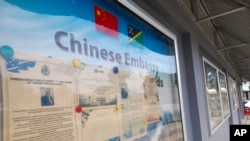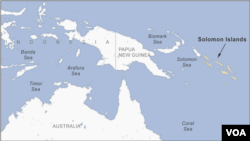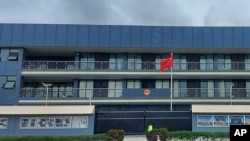On the main street of Honiara, capital of the Solomon Islands, the Chinese presence is noticeable — some people on the street, some characters on the signs and at almost every cashier’s counter.
Locals say almost all of the grocery stores and convenience shops selling everything from snacks to electronics are owned by ethnic Chinese. In the city’s Chinatown, where three people died during riots in November that many blamed on Chinese ties, the Chinese presence is almost inescapable.
These days, some local residents are expressing dissatisfaction at what they see as China’s takeover of the Solomon Islands’ construction industry.
“A lot of Chinese firms, construction firms, have come into the country and there's no way we can compete with them in terms of pricing,” Ricky Fuo’o, chairman of Solomon Islands Chamber of Commerce and Industry, told VOA Mandarin.
“Just the sheer size of these companies. … They are huge. So that’s one of the industries that we’ve seen that’s slowly being penetrated and taken over,” Fuo’o said.
In October 2019, the small but strategically important South Pacific island nation cut ties with Taiwan, established diplomatic relations with China, and signed agreements with China’s Belt and Road Initiative, a massive infrastructure project that is planned to stretch from Asia to Europe.
In return, China promised $730 million for financial aid, and has taken over multiple infrastructure projects in the country. Chinese state-owned enterprises (SOE) such as China Civil Engineering Construction Company (CCECC), China Railway Construction Company (CRCC) and China Harbor Engineering Company (CHEC), are building most of these projects in the Solomon Islands.
The stadium project for the 2023 Pacific Games is one example. China’s state-owned company CCECC has won five of the seven infrastructure projects for the stadium in Honiara that includes facilities to accommodate many sports. At the same time, CCECC is building half of the main road in Honiara. There’s only one road, and aJapanese company is building the other half.
Bob Pollard, managing director of the local firm, Kokonut Pacific Solomon Islands, which makes coconut oil-based personal care products, told VOA Mandarin he thinks it is unfair because local companies cannot compete with these Chinese state-owned enterprises.
“I think it's a real concern. … I don't think it's a level playing field,” Pollard said. “Who knows how much subsidy they receive from the Chinese government.”
Others think China is just helping the island develop its economy. The Solomon Islands consist of six major islands and more than 900 smaller islands in Oceania, covering a land area of about 28,400 square kilometers. The country achieved independence from Britain in 1978.
“I think China is not taking over Solomon Islands. … China is developing [the] Solomon Islands and they build public facilities and so forth,” Walton Naezon, former minister for Commerce, Industries and Employment, told VOA. Naezon is now the director at Gold Ridge Mining, an open-pit mining operation about 30 kilometers outside Honiara.
“That’s a good thing for the country. I'm happy that most of the Chinese investments here are in terms of public property. They are not loans, they are grant money,” he said.
A report from the Council on Foreign Relations pointed out China’s interest in the region.
“The Chinese government views the Pacific Island region as an important component of its Belt and Road Initiative (BRI),” the report said. “Specifically, it sees the region as a critical air freight hub in its so-called Air Silk Road, which connects Asia with Central and South America.”
Although all can see China’s influence here in Honiara, few know how these Chinese companies operate.
Michelle Lam, a consultant, is an ethnic Chinese born in the Solomon Islands to Hong Kong immigrants who came to teach English in the 1960s.
“They (ethnic Chinese) are everywhere. They run the shops, they have businesses, they move around. But you can't call them Chinese presence. I guess this is just people doing their work,” Lam told VOA. “When people talk about Chinese presence, I guess they mean the (Chinese) SOEs (state-owned enterprises) who are here to do certain work,” in the construction industry on infrastructure projects.
Lam, who previously worked at China Harbor Engineering Company, said this has to do with how the Chinese SOEs operate.
“According to them, they're just here to do their construction work. They don't mingle at all,” she told VOA.
“When I was with China Harbor, the camp was very tight. They bring people in to work. They (the workers) basically work, eat, sleep, work, eat, sleep. They (the company) have zero tolerance for socialization,” she added.
VOA approached staff from China Harbor and China Civil Engineering Company for interviews, but both rejected offering comments on their current projects.
Liu Ze, the secretary of the Solomon Islands Chinese Business Council, told VOA Mandarin that Chinese workers arrived more than a century ago when the nation was a British protectorate.
Five people arrived from Guangdong Province, brought in to work as cooks to work as carpenters, according to Liu. By 1914, one, Kwong Cheong, had a trading business at Tulagi, the colonial capital, according to the Solomon Encyclopedia, which states that between 1920 and 1933, the Chinese population increased from 55 to 193.
“Most of them are from China’s Guangdong Province. They came over 100 years ago with the British and expanded their businesses here in Honiara,” he said. Britain had declared a protectorate over the island mainly to forestall a threat of annexation by France.
After World War II, the Chinese community increased and in the late 1940s, 1950s and 1960s began to integrate into colonial society, took out British citizenship and came to control much of the Protectorate's retail trade and became dominant in Honiara and the main provincial towns, according to the Solomon Encyclopedia.









